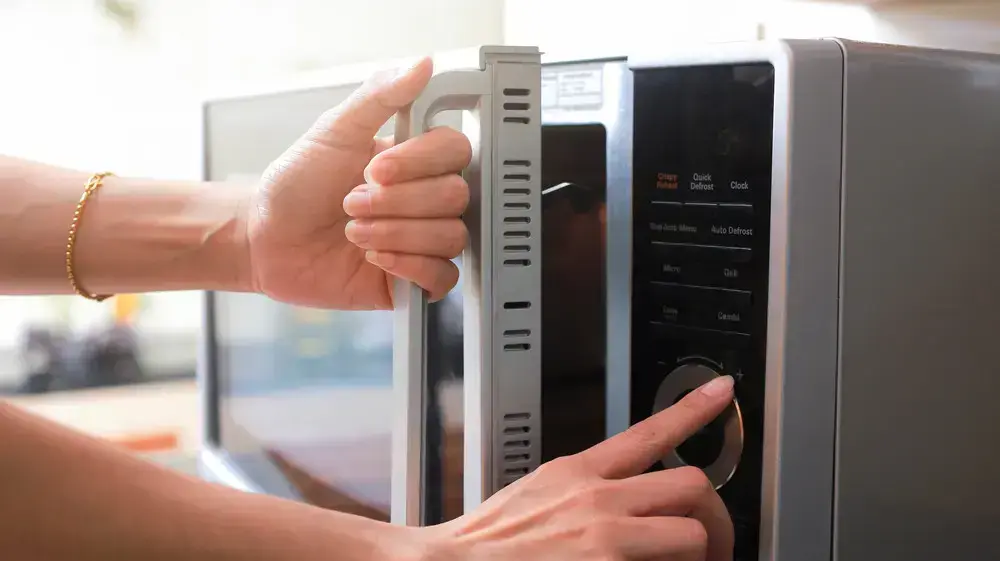health
Nutrition and diet
Preventive nutrition
4 foods that you really should not heat in the microwave
It is difficult for us to imagine our kitchen without it, but there are foods that are absolutely better to heat the hard, long or complicated way - even to reduce the risk of food poisoning or exposure to carcinogens
Tags
microwave
healthy nutrition
Walla!
health
Tuesday, 23 February 2021, 07:02
Share on Facebook
Share on WhatsApp
Share on general
Share on general
Share on Twitter
Share on Email
0 comments
Sometimes it is better to warm up the harder way.
Woman turns on microwave (Photo: ShutterStock)
About 3 decades ago a new invention entered kitchens in the western world - the microwave - and changed their face forever.
Today it is hard for us to imagine ourselves getting along without this device that helps us heat or thaw food at lightning speed.
We quickly learned not to put aluminum foil in it (because it could cause shortening and burning) and later discovered that certain types of plastic can also emit toxic chemicals when heated.
But are you aware that there are also certain foods that microwave heating is harmful to and may even make them dangerous to health?
More on Walla!
NEWS
The Astraznica vaccine does not protect against the South African variant
To the full article
Processed Meat Processed meat
products usually contain chemicals and preservatives that are intended to extend their shelf life.
Heating these materials in the microwave can make them even more harmful.
For example, a process of cholesterol oxidation may occur, following the heating of processed meat in the microwave.
Several studies have found that heating processed meat in the microwave may contribute to the formation of COP which are byproducts of oxidized cholesterol.
These substances have been found to contribute to the development of cardiovascular disease.
In these studies, different cooking and heating methods were compared, and it was found that microwave heating is the method that causes COP formation to be the most likely of all methods.
Some of the nutritional values become harmful.
Turkish spinach salad (Photo: Afik Gabay)
Chicken
The most important thing to understand about using a microwave is that the heat they produce is not always high enough to destroy bacteria.
This is because this appliance heats from the outside to the inside and not from the inside to the outside.
Consequently, certain foods that are considered pre-disaster in terms of the risk that they will contain harmful bacteria, may be less suitable for microwave heating.
One of these foods is chicken, which is a food at high risk for infection by bacteria like salmonella, for example.
Therefore, chicken must be cooked thoroughly and high heat by another means - not in the microwave, which has a high chance of keeping a certain amount of bacteria alive because it does not heat all parts of the food equally.
More on Walla!
NEWS
This is what happens in your body when you eat before bed
In the UK they are testing whether a vaccine cocktail will be more effective
Eating nuts from this age on can prevent dementia
Cartilage wears out and knees hurt?
Get to know the treatment that will put you on your feet
Green Leaves
If you have prepared for yourself a healthy dish that contains green leaves such as spinach, kale, celery and the like, you must have thought about the high nutritional values that will provide you and rightly so.
Only if you want to continue to get the nutritional benefits from these green foods even the day after cooking - avoid heating them in the microwave.
Microwave heating can turn the nitrates in green leaves - a substance beneficial to health on its own and in its natural form - into nitrosamines, a substance that can have a carcinogenic effect.
And for the exact same reason it is not recommended to heat beets in the microwave as well.
Toxic and dangerous spores.
Spoon of rice (Photo: ShutterStock)
Rice
According to the US Food Standards Agency, heating rice in the microwave can lead to food poisoning. This is due to a bacterium called Bacillus cereus that loves to reproduce in the humid and warm environment of cooked rice. Heat does kill this bacterium but not its spores which are considered toxic and resistant More heat than the bacterium itself.Several studies have shown that when heated rice comes out of the microwave and is left at room temperature, spores that may be inside begin to multiply and if you eat this rice you are at high risk of food poisoning.This is because spores will start secreting toxins into rice. Foods that can be caused by the germs of this bacterium: The first is manifested in diarrhea, and the second in vomiting.Rice is not the only food that is vulnerable to the germs of the bacterium Bacillus cereus, but is the most common where it happens.
Share on Facebook
Share on WhatsApp
Share on general
Share on general
Share on Twitter
Share on Email
0 comments

